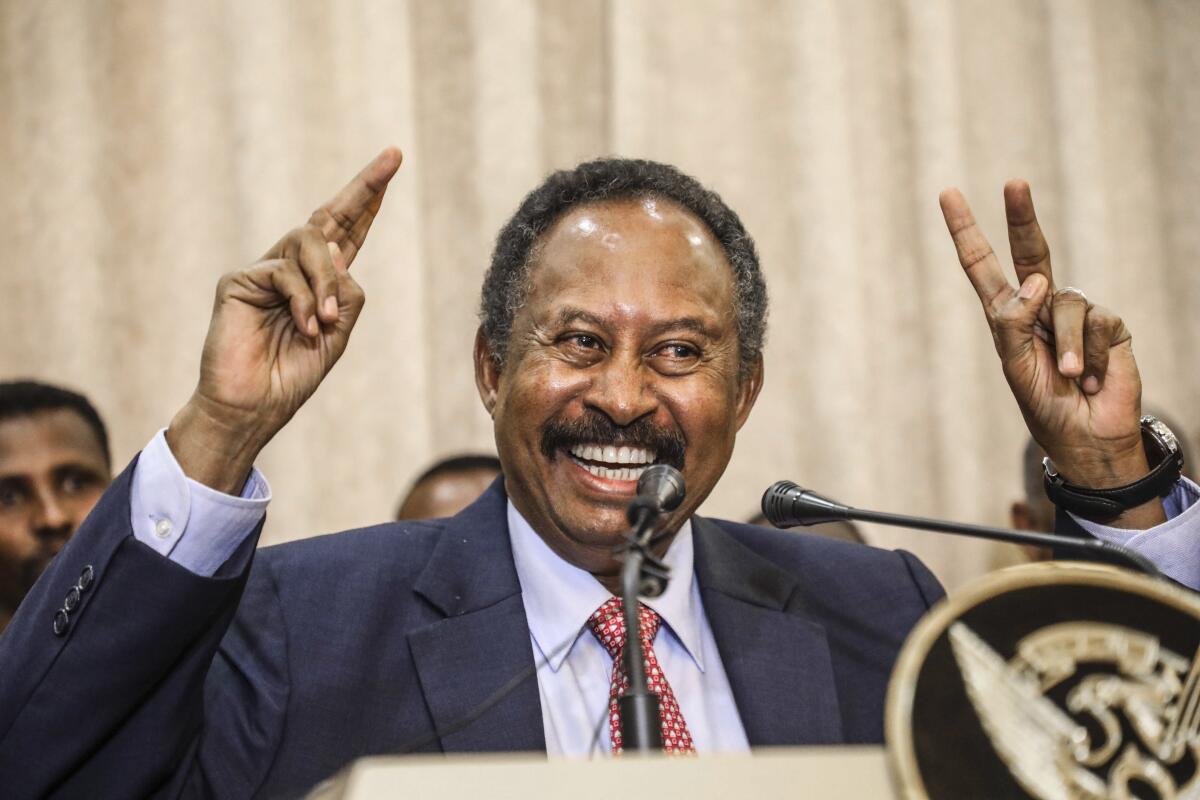Sudan PM names first Cabinet since removal of al-Bashir

- Share via
CAIRO — Sudan’s newly appointed prime minister on Thursday announced his Cabinet, the first since the military’s ouster of autocratic former president Omar al-Bashir in April. The new members included Sudan’s first woman foreign minister and a former World Bank economist.
The Cabinet is part of a power-sharing agreement between the military and pro-democracy demonstrators, following pressure from the United States and its Arab allies, amid growing concerns the political crisis could ignite a civil war.
“A new stage in Sudan’s history starts today,” Prime Minister Abdalla Hamdok said at a press conference in the capital, Khartoum. “We are seeking an end to the war and (want to) achieve sustainable peace.”
The Cabinet includes at least four women. He picked Asmaa Abdalla as the first woman to serve as foreign minister in Sudanese history.
Hamdok said overhauling the county’s ailing economy would be one of his top priorities. Mass demonstrations that led to al-Bashir’s military ouster initially erupted in Sudan in December over dire economic conditions but quickly turned into calls for the former president to step down after three decades in power.
The prime minister picked Ibrahim Elbadawi, a former World Bank economist, to lead the Finance Ministry.
Elbadawi holds a doctorate in economics and statistics from North Carolina State and Northwestern universities in the U.S. He was Lead Economist at the Development Research Group of the World Bank.
The power-sharing deal stipulates that the military members on the Sovereign Council would choose the defense and interior ministers.
The military nominated Lt. Gen. Gamal Omar, who was a member of the disbanded military council that took over power after al-Bashir’s ouster, as defense minister. It named al-Traifi Idriss as interior minister.
Hamdok said he was still negotiating with the pro-democracy movement on the remaining two positions to complete his 20-member Cabinet.
Al-Bashir, who came to power in an Islamist-backed military coup in 1989, had failed to keep the peace in the religiously and ethnically diverse Sudan, losing three quarters of the country’s oil wealth when the mainly animist and Christian south seceded in 2011 following a referendum. That loss of oil revenue plunged the economy into a protracted crisis that continues to this day.
Sudan has also been convulsed by rebellions in its far-flung provinces for decades, and while a rebel alliance has joined the pro-democracy coalition, it said last month that it should be represented in the transitional government.
The power-sharing deal calls for the government to reach a peace agreement with the rebels within six months. Hamdok has said peace with armed groups is one of the top priorities during the transition.
More to Read
Sign up for Essential California
The most important California stories and recommendations in your inbox every morning.
You may occasionally receive promotional content from the Los Angeles Times.













